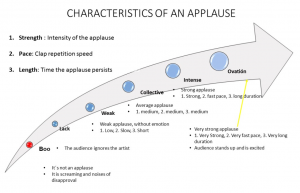Modern Masterpieces
by berberis on Mar.23, 2013, under Choir, Concerts, LCS, Rehearsals
Saturday, 23rd March 2013, Great Hall, Goldsmiths College.
Henryk Górecki: Totus Tuus
Igor Stravinsky: Ave Maria/Pater Noster
John Tavener: The Lamb/The Tyger/Song for Athene
Frédérick Chopin: Polonaise in E flat Minor Op. 26 No. 2
George Gershwin: Prelude No. 1 in B flat major
Piano: Andrew Dutson
Arvo Pärt: Sieben Magnificat-Antiphonen
Fratres
Piano: Nico de Villiers
Violin: Sebastian Müller
De Profundis
Magnificat
Nunc Dimittis
What I really loved about the music for this concert was its precision. The main problem with it was its precision. You have to be supremely confident to stay in tune whilst first one person, then those around them, then half a section, and finally the entire choir, sags half a tone, then another half, and finally into another key entirely. It’s also very melancholy, which – in my opinion – makes any deviation from the score not just inconsiderate, but insulting.
It’s not difficult to stay in tune. It just takes care and concentration. I get irritated with people who either can’t or won’t take the time to learn their parts. I get annoyed when they get phrases wrong despite having the tune played to them repeatedly. I get angry when they refuse to take any notice when they’re told they’re wrong. If you end a phrase a tone lower (and it’s always lower) than it should be, then you need to be paying more attention to what you are singing. You should also be paying attention to what your neighbour is singing. If they’re out of tune, they need to be told.
I have the word PITCH!! written like that in the last three systems of the Górecki. It matters. If you now can’t reach the notes you once could, consider moving to a lower voice part. Don’t think of it as a failure, think of it as a new adventure. These are the notes the composer wrote – please sing these, and not the notes you think they are.
Rant over. Don’t get me started on counting.
Transfixed utterly by the Fratres. Damn.
The Universal Edition scores we used for the Nunc Dimittis and the Antiphonen have the number of beats in the bar helpfully indicated by a big number above the bar, whereas the other pieces have the much more subtle time signature. Not sure why there’s a difference: if you can count, it doesn’t matter.
There are some really oddities in the Antiphonen. In the premiere, the sopranos and basses aren’t singing what is printed in the score. From bar 46, they sing what is not printed. This might explain why this is called the original version, although why Arvo Pärt would rewrite his own composition – or allow it to be changed – is strange. A cursory look online doesn’t reveal any clues, but I’m happy to be proved wrong.
There is a wealth of Pärt analysis online: in just one search, I found a bewildering doctoral dissertation by Allan J. Ballinger DM that I’ve set aside a day or so to read, and a more accessible Guardian piece by Tom Service. I can only comment as an amateur alto, and say that we got to explore the depths of our range with the first tenors in the O Adonia, as well as treating our vocal chords to a nice top E in the O Schlüssel Davids.
All of this should really be hanging around a church vault for a few seconds after the singing has finished, not being stifled somewhat by the ceiling of Goldsmiths Great Hall, but the venue is what it is, and at least the sight lines are generally good so you can keep an eye on Dan.
Of the Pärt, I think my favourite was the Nunc dimittis. From the 2001: A Space Odyssey opening few bars, to the Gloria Patris, where the melody is passed seamlessly between voice parts, it’s gorgeous. Special mention goes to bar 93 – which is hair-on-the-back-of-the-neck-raising, spine-tinglingly beautiful – and bars 103-105; I have a version on my phone where these bars are the musical equivalent of having the best chocolate in the world melt in your mouth. Stunning.
This was Andrew Dutson’s last performance with the LCS, and he received a lengthy round of applause following his performance. I often wonder what the audience thinks of the foot stamping that’s become something of a feature at the end of a concert. It’s something I’ve only come across in choirs and, although it’s mentioned in passing here, it doesn’t appear on this lovely little pic…
…although it’s less ‘lightly stamp’ than trying to split the floor. If I was inclined, I’d do some more research.
What else? Nothing useful. Find it all on YouTube and immerse yourself.
